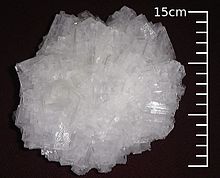
Back تاريخ الملح Arabic লবণের ইতিহাস Bengali/Bangla Història de la sal Catalan Historia de la sal Spanish Histoire du sel French Historia do sal Galician Sejarah garam Malay História do sal Portuguese Geschiedenisse van zout VLS 盐的历史 Chinese



Salt, also referred to as table salt or by its chemical formula NaCl (sodium chloride), is an ionic compound made of sodium and chloride ions. All life depends on its chemical properties to survive. It has been used by humans for thousands of years, from food preservation to seasoning. Salt's ability to preserve food was a founding contributor to the development of civilization. It helped eliminate dependence on seasonal availability of food, and made it possible to transport food over large distances. However, salt was often difficult to obtain, so it was a highly valued trade item, and was considered a form of currency by many societies, including Rome. According to Pliny the Elder, Roman soldiers were paid in salt, from which the word salary is derived, although this is disputed by historians.[1][2] Many salt roads, such as the Via Salaria in Italy, had been established by the Bronze Age.[3]
All through history, availability of salt has been pivotal to civilization. In Britain, the suffix "-wich" in a place name sometimes means it was once a source of salt, as in Northwich and Droitwich, although other "-wich" towns are so named from the Saxon 'wic', meaning fortified dwelling or emporium.[4] The Natron Valley was a key region that supported the Egyptian Empire to its north, because it supplied it with a kind of salt that came to be called by its name, natron. Today, salt is almost universally accessible, relatively cheap, and often iodized.
- ^ Cite error: The named reference
saltMoneywas invoked but never defined (see the help page). - ^ "A Brief History of Food: Salt". Tastes of History. June 16, 2020. Retrieved June 7, 2024.
- ^ Peake, Harold (1922). The Bronze Age and the Celtic World. London: Benn Brothers. ISBN 9789356087347. OCLC 3728495 – via Project Gutenberg.
- ^ "Domesday Book". Domesday Book. Archived from the original on 2012-02-27. Retrieved 2012-02-13.
© MMXXIII Rich X Search. We shall prevail. All rights reserved. Rich X Search